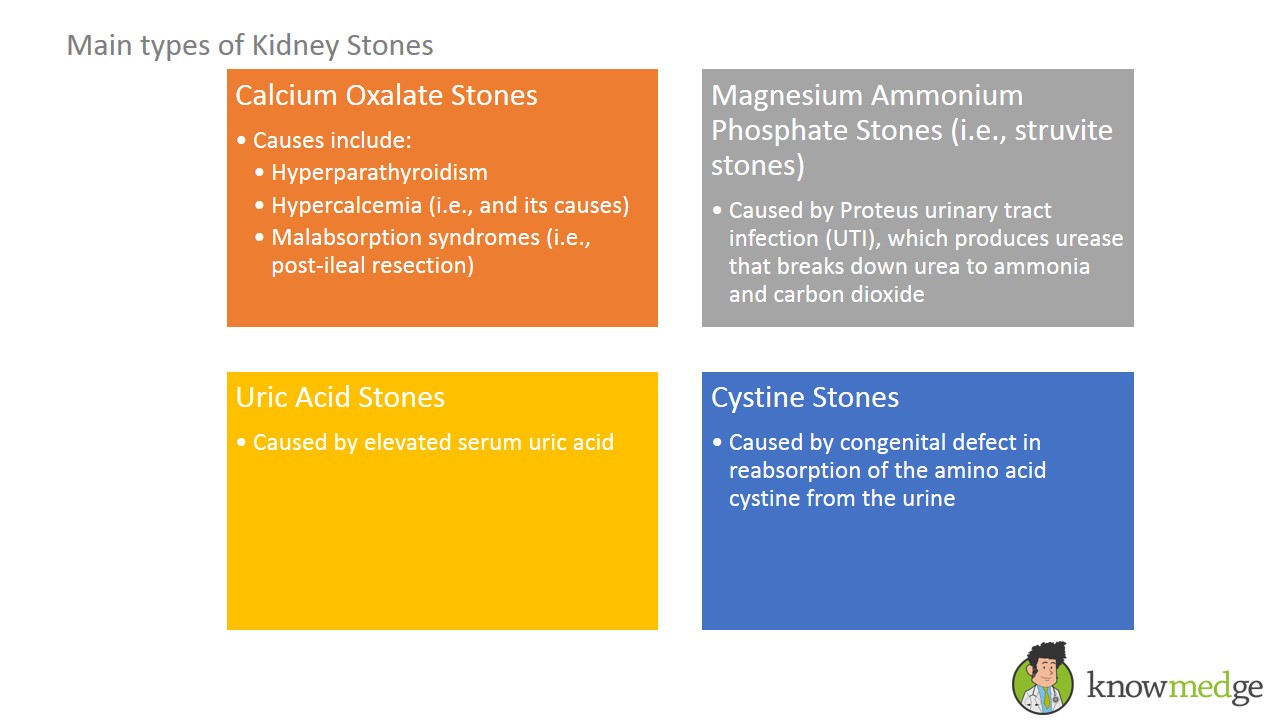IM Board Review: Kidney Stones
Nephrolithiasis is one of the topics to master for the USMLE Step 3, ABIM, and other medical exams where Internal Medicine is a major focus. The following is an excerpt out of Cracking the USMLE Step 3.

Four Types of Kidney Stones
Calcium Oxalate Stones
- Most common type of stone
- Causes include:
- Hyperparathyroidism
- Hypercalcemia (and its causes)
- Malabsorption syndromes (especially post-ileal resection)
- Calcium binds oxalate in the urine and allows us to excrete oxalate, so if the patient takes in low diet of calcium or has any state of malabsorption, oxalate can precipitate in the urine
- Urinalysis may reveal oxalate crystals
- Ask the patient to bring in stone for analysis
- Usually, first do a 24 hour urine collection to measure urine calcium to detect hypercalciuria
- Can check a parathyroid hormone (PTH) level in patients if you suspect hyperparathyroidism
- Treatment is hydration and analgesia
- Thiazides may reduce urinary calcium
- Treat underlying cause
Magnesium Ammonium Phosphate Stones (i.e., struvite stones)
- Called Staghorn calculi if large enough to obstruct the kidney-ureter junction
- Caused by Proteus urinary tract infection (UTI), which produces urease that breaks down urea to ammonia and carbon dioxide
- Urinalysis reveals basic pH secondary to ammonia
- Urine culture helpful to detect bacteria
- Treat UTI with Bactrim or Ciprofloxacin
Uric Acid Stones
- Caused by elevated serum uric acid
- Seen in leukemia secondary to tumor lysis syndrome, gout, or Lesch-Nyhan syndrome
- Do not give thiazides to these patients as they cause hyperuricemia
- Urinalysis shows acidic pH (i.e., less than 5.5)
- These stones are not visualized on a KUB
- Treat with allopurinol (i.e., decrease production of uric acid by inhibiting xanthine oxidase)
Cystine Stones
- Rare
- Caused by congenital defect in reabsorption of the amino acid cystine from the urine
- Urinalysis shows acidic pH (i.e., less than 5.5)
- These stones are not visualized on a KUB
Whether you’re studying for the Internal Medicine Board Exam, USMLE Step 3, or any other medical exam – it’s critical to understand kidney stones! To learn more Nephrology pearls, check out the 10 High-Yield Nephrology pearls you need to know for your internal medicine boards!








